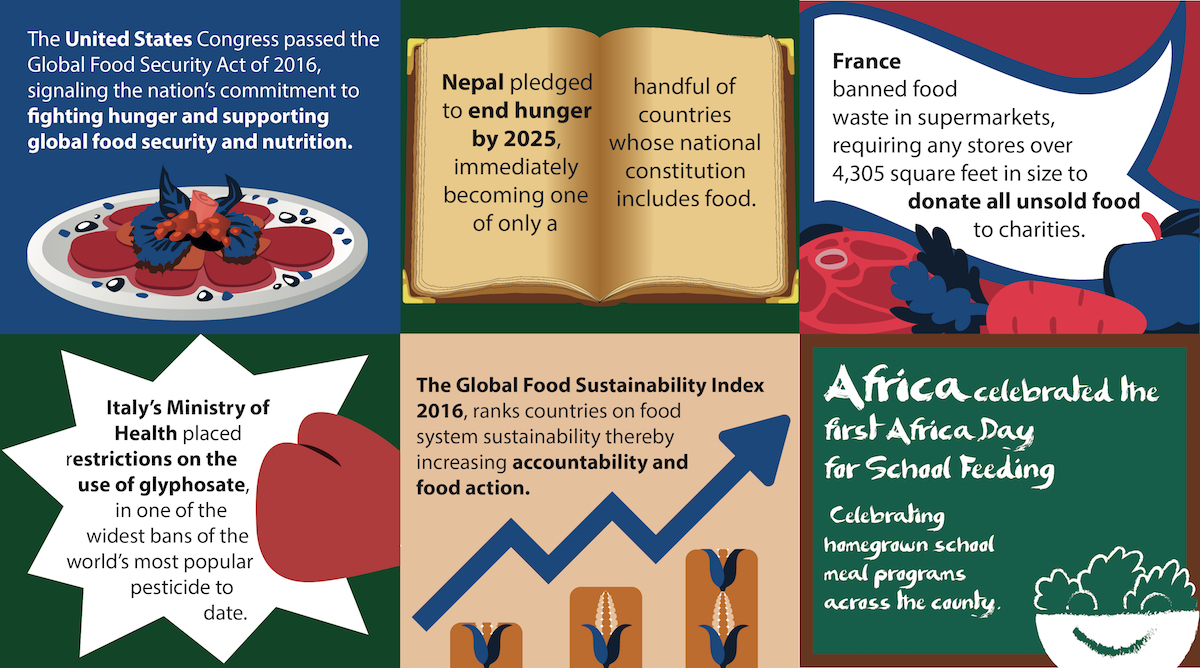For the human race to survive and thrive, we must feed ourselves in a safe and sustainable manner. This will be a considerable challenge, especially with the global population expected to reach 10 billion by 2050. Such rising demand will require a 70% increase in food productivity and a doubling in protein production worldwide, at a time when arable land degradation is increasing and crop yields are starting to show a decline. Despite the increasingly bleak scenario we face, there is a solution: the alignment of the human race and the planet’s ecosystem by supporting a revolutionary transformation in global agriculture, with neem at the forefront of this imperative change.
With continued efforts from businesses, organizations and populations around the world to strengthen food security, we are convinced that 2017 will be the Year of Sustainable Food.
Noteworthy Food Moments of 2016
 Source: Foodtank (2017)
Source: Foodtank (2017)
While these new management and distribution policies will be fundamental in establishing a global food system that works for everyone, we must also remember to drive innovation in the very we produce food. Such innovation can be found in global efforts to build an entirely agro-ecological and sustainable system. In order to achieve this we must integrate science, farming practices and social change processes in agriculture. The road to sustainability is much more than increasing yields and accumulating profits, but also involves establishing practices that free farmers from expensive and damaging fossil fuel-based inputs and industrialized seeds, placing people at the center of food distribution planning and management. Relying instead on safe and natural practices such as biological crop care, organic farming generates environmental, nutritional and socioeconomic benefits that far outpace their conventional counterparts. This innovative method in modern agriculture ultimately produces healthier yields, enhances natural capital through the restoration of agricultural land and has far greater resilience.
The role of the farmer in society holds great significance and we are thrilled to see so many farms transition to an organic agricultural system. Despite requiring 2.5x more labor than conventional farming, organic alternatives yield on average 10x the profit for farmers. Soper Farms has increased its net income from $180/acre with GMOs to $578/acre with organics and the operational costs for running a farm fall by as much as 40% once it is organically certified.
As consumers we must also become more connected to our food and the good news is that we already are. The demand for organic food has increased by nearly 50% every year for the past five years The global organics market, worth US$80.4 billion in 2014 (and having increased five-fold since 1999) is expected to double to US$161.5 billion by 2018. Sustained demand from the 43 million Americans who buy organic products every week supports a domestic market worth US$35.9 billion in 2015. Markets in Germany, France and the United Kingdom have also reached a cumulative US$17 billion this year. In Brazil, the market has grown by 35% in 2016 to $2 billion.
One of the great challenges will be to transform the global food system into one that meets the nutritional needs of all in a sustainable manner. Essential for life on this planet, sustainable agriculture provides the services necessary to secure our global food supply, ensure global health and further strengthen the global economy. By choosing organic, both in our production and consumption habits, we will begin to witness the start of a new green revolution.